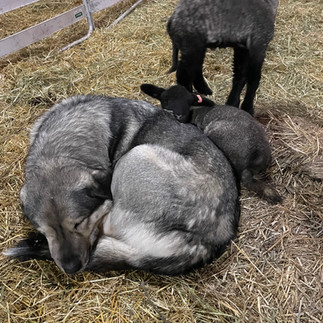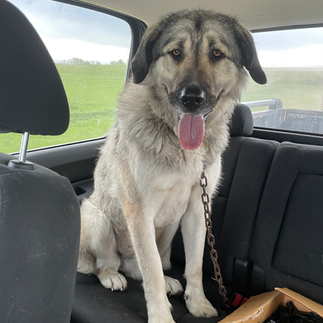All About Livestock Guardian Dogs
- sourisflatsranchsa
- Apr 16
- 3 min read
Our Livestock Guardian Dog Team
by Caitlyn Douglas - Derkson

Supporting wildlife is an important part of Regenerative Ranching because birds, elk, rabbits, and even predators are a sign that soil is healthy and the ecosystem is thriving. In the Souris River Valley where our ranch is located, the lush vegetation on the valley floor, the sheltering hills, and the Souris River supports an abundance of wildlife, including coyotes! Our ewes are an important part of our grazing program because they control the spread of weeds and invasive brush. To keep our sheep safe from coyote attacks while they are on pasture we use a team of four Livestock Guardian Dogs: Phoebe, Poppy, Rosie, and Nancy.

Livestock Guardian Dogs live with livestock full time, they have an instinctive ability to guard the animals that they bond with. Specific breeds have been trained and bred for this work since livestock were domesticated. They are not pets, they are working dogs who are extremely aggressive with strangers and predators.
Mainly our dogs act as a deterrent for predators by checking and marking the perimeter of each new paddock and barking constantly. This intimidating presence is usually enough to keep predators and pests away, but if a coyote tries to approach our livestock, the dogs will chase them away or even fight them. We are happy to share our pastures with the local coyotes as long as they find meals that are not our sheep or calves. In fact, if coyotes are not bothering our livestock, it is important that we leave them alone. If the hierarchy of a coyote pack is upset, more aggressive coyotes could move in.
Phoebe is our very first livestock guardian dog and our “boss dog”. She is a 5 year old Great Pyrenees with strong protective instincts toward our sheep and family. Phoebe is our smallest dog and has learned to escape the electric fence that we build our paddocks with, so she moves from the house to the barnyard to the paddocks as she pleases. Often, we worry she isn’t working, but she maintains the record for most recorded coyote chases!
Poppy is the second oldest and the most reliable of our dogs. She is a Kangal which means she has lots of energy, constantly patrolling the fence line and scanning the horizon, always the first to spot coyotes in the distance. Kangals can be aggressive, but Poppy is a sweet girl who always lets the lambs snuggle with her. She is our kindest and hardest working dog who has become very serious over the years, preferring to be in the pasture where she is the leader.
Rosie is our youngest Great Pyrenees (and is my favourite). Rosie is always the first to greet us at the gate and loves pets. Her strength is watching over the lambs in the barnyard because she likes being visited by our family throughout the day when we do chores, and she doesn’t have the same amount of energy as our other dogs. Rosie always surprises me with how well she bonds to each new group of lambs. She is vigilant about who she allows in the barnyard and pouts whenever I bother her lambs.
Nancy is our youngest dog. She is a 2 year old Kangal and is the largest of the dogs. Nancy is at the end of her training because she can’t always stop herself from chasing the sheep, but she had a very successful summer in 2024 on pasture with Poppy. She has a ton of energy and is our most aggressive dog, so she does best on pasture where she has lots of work. I am very happy to have her in the pastures in the summer months.

Our dogs bring a lot of joy to sheep farming but they are more work than most people let on. They are intelligent creatures with feelings and learned behaviours, so there are always changes in the pack dynamics and the dog’s habits. We must constantly correct, problem solve, and stay adaptable to keep everyone safe and happy. Livestock Guardian Dogs are also a big expense, they eat 8 cups of dog food a day each, need to be spayed/neutered, need annual and emergency veterinary care, and take at least 2 years to train. Livestock Guardian Dogs do not like strangers so we must be very careful when we have visitors at the farm.

Despite all the work, our dogs are one of my favourite parts of sheep farming! They are so loyal and loving to the people they bond with. Their calm presence is comforting and watching them work is really rewarding. They aren't pets, but they are family! As my Dad says, “The best part of owning sheep is the sheep dogs!”



























Comments